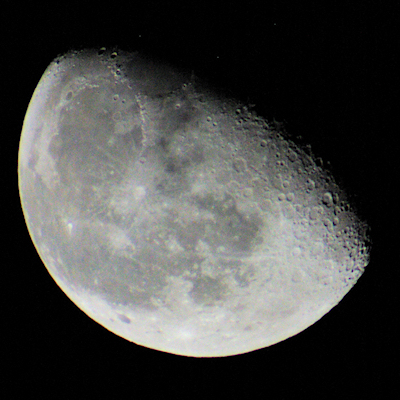To the Moon... or Bust...
11 October 2009 • by Bob • Humor
I have always been fascinated by all things space-related; the moon, the planets, the stars, etc. Perhaps it was watching all of the live TV broadcasts during the race to the moon in the 1960's, or perhaps it was spending part of my childhood living in Florida where astronauts would drop by the schools to talk about what they did for a living. My dad probably had a lot to do with this space-age attraction; when we were living in Tampa, he got us up early one morning and drove across Florida so we could be there to watch Apollo 16 launch for what was to become one of the last manned missions to the moon, and he bought the telescope that I continue to use to this day.
In any case, I was fascinated with space throughout my childhood. Over the years I followed the stories about the development of the space shuttle program, I watched several of the shuttle launches on television, and I even managed to make it back to Florida to attend one of the shuttle launches.
I tell you all of these things just to set the stage - when I heard that NASA was going to smash a rocket into the surface of the moon at 7:30am EST on October 9th, 2009, my first thought was shared by many people around the globe: "What gives NASA the right to bomb the moon?"
This was followed quickly by my second thought, which was: "Cool - can I watch?"
In fact, NASA had said that the explosion would be large enough to be seen by amateur enthusiasts, which is why I stayed up all night on October 8th to wait for it. I set up my telescope in the backyard, and I had a computer nearby that was streaming the live video feed from NASA. So I waited, and I watched, and I waited, and I watched, and then... nothing happened. There came a time when all of the folks at NASA's Ames Research Center in California started cheering, and it became obvious that whatever was going to happen had just done so, but not only was it impossible to see anything through my telescope, it was impossible to see anything on NASA's cameras that were smashing into the moon to record the event.
When you study the history of NASA's exploratory missions to places like Mars, you see a long pattern of failures due to one problem or other, and a lot of very expensive equipment has met a tragic end by plowing into the surface of Mars. So now that NASA has a chance to make up for their bad track record by intentionally crashing something into alien soil, you'd like to think that they've had enough practice to get that one thing right.
But unfortunately, they didn't.
